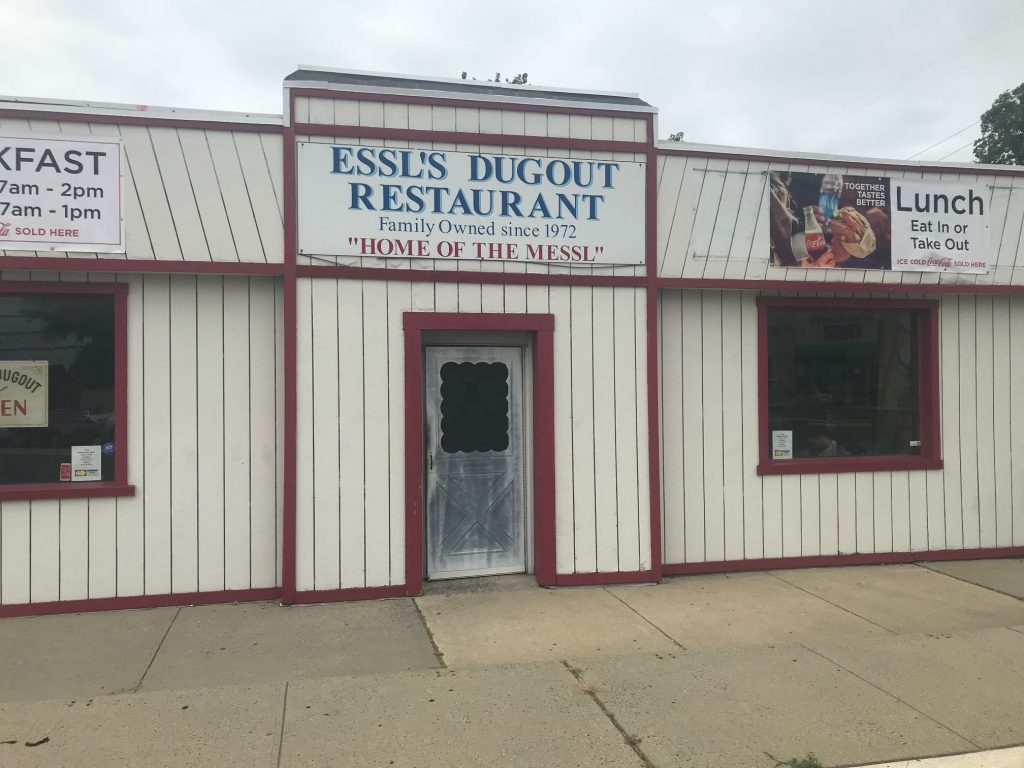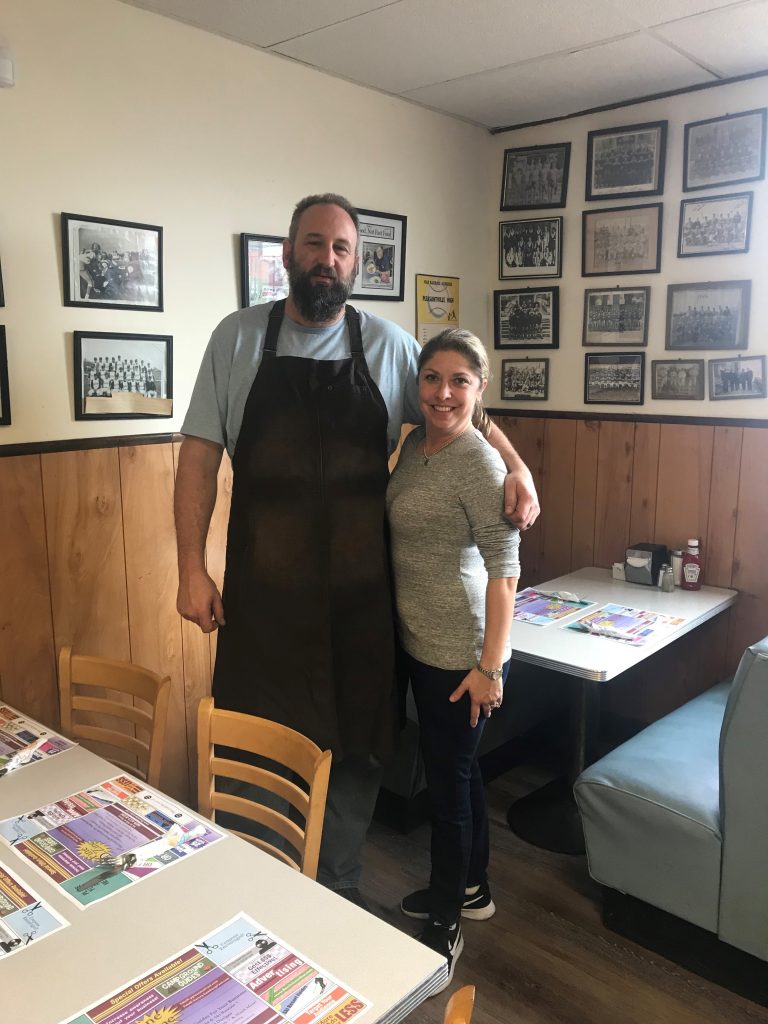Paying it Forward: Q&A with Bob and Carey Hettmannsperger of Essl’s Dugout
How THRIVE South Jersey is Helping One 50-Year Old Business Support its Community During the Pandemic
When Bob and Carey Hettmannsperger purchased the historic diner Essl’s Dugout in 2018, their goals were to put their culinary skills to use by running a successful restaurant and making delicious food for their community. For nearly two years, they did just that, serving signature breakfast plates and chicken pot pies to a loyal customer base.
Then, the COVID-19 pandemic hit, and Bob and Carey’s well-established business was turned upside down. At a time when many restaurants were forced to close, they quickly pivoted to find a way to stay open. Thanks to support from THRIVE South Jersey, an initiative of New Jersey Community Capital (NJCC) and the Pascale Sykes Foundation, Bob and Carey were able to quickly secure financial support that has allowed them to continue doing what they do best: making and serving good, quality food to the members of their West Atlantic City community.
Today, Bob and Carey are much more than restaurant owners. They are an essential support system to their community, providing food to working families and keeping other businesses such as meat and produce vendors afloat. We had the chance to speak with them about the important role Essl’s plays in the community today, what support from NJCC has meant for their business and how this support has helped them to pay it forward.
Can you tell us the history behind Essl’s Dugout?

Carey: Essl’s Dugout is a small diner-style restaurant that’s been around for nearly 50 years. Bob Essl founded it in 1972, and he named it “Essl’s Dugout” because the family had three boys who played for the local Pleasantville baseball team. Our family bought the business in 2018. We both have culinary backgrounds, and we had been looking for an opportunity to own and manage our own restaurant. Of course, we knew when we bought the business that we wanted to keep the original name to keep the history alive. Every day, people would walk in reminiscing about how they’ve been coming to Essl’s since they were children.
It sounds like Essl’s holds a special place in your community. What were your first thoughts when the COVID-19 pandemic hit and you learned that all restaurants could resume operations as takeout only?
Bob: My immediate concerns were what would happen if we had to shut down the restaurant completely. How would we pay our vendors and staff? How would we pay our mortgage on the restaurant building? Even if we were allowed to stay open, how would we get supplies from our distributors? Families in the area would be out of work and therefore wouldn’t be able to spend money eating out, so how could we stay open even if we were able to manage it?
Even through all this uncertainty, we acted quickly. Within a day, Carey and I developed a plan that would help us to stay open by restructuring our business around a takeout model that allows people the option to purchase cooked food or meal kits to cook at home. We also sell a variety of groceries including meats, vegetables and pantry items.
Can you tell us about how you first started working with NJCC?
Bob: Before we bought Essl’s Dugout, we were looking for a restaurant to invest in but knew we wouldn’t qualify for a traditional bank loan because we didn’t have enough money to put down. We asked around and eventually, a representative at a bank referred us to Laura, a program manager at NJCC. We met with Laura in June of 2018, and she and her team realized we had the resumes and cooking experience to put together a successful restaurant. Within four months, we had a loan and a working restaurant. The whole process moved like clockwork. Everything was easy, there were no hidden costs, and the NJCC team made everything very clear and accessible for us. It makes me want to do it again, because it was so easy!
How has your new loan through the THRIVE South Jersey initiative helped your business weather the pandemic?
Bob: As soon as the pandemic hit, we contacted NJCC right away to find out what kind of support was available to us if we couldn’t pay our loans. NJCC quickly got back to us with information about the THRIVE South Jersey program, a loan that provides immediate, no-cost assistance to businesses like ours that are less likely to have access to traditional sources of capital.
Applying for the program was a matter of completing a simple application form online. Less than 14 days after submitting our application, the money was in our account. It was unbelievable how fast it happened and how quickly we were able to cover all our costs. Now, we can breathe. We know we’re going to be okay. Without this support, we would have had to close like most of the other restaurants in our neighborhood. It is amazing to have this kind of financial support that allows the little guys to stay open. Many of our friends in the restaurant business have not been as lucky and are still trying to receive loans through the government. NJCC cares, and that’s the biggest thing.
Take us through a day in the life at Essl’s during a pandemic. What do business operations look like for you right now?
Bob: When we decided to stay open, our number one goal was to continue providing quality, affordable food to support the working families in our community. It took some reconfiguring: we changed the tables around, bought an extra freezer, purchased a trailer and made use of a walk-in refrigerator we ordinarily wouldn’t have used to store groceries. We still offer our full breakfast and lunch menu, but we also sell meat, dairy products, produce, pantry items and meal kits people can take home to cook.
Carey: Every day, Bob starts his day between 3:00 and 4:00 a.m., preparing food and posting about our latest offerings on Facebook. I get started in the kitchen around 7:00 a.m., baking, meal prepping, and preparing pot pies and soups. And from there, it’s nonstop work all day to serve our customers and make sure we have enough food prepared. It’s an all-hands-on-deck situation: our kids are involved, and my sister and family are helping, too. Everyone is pitching in to meet the demands of this new normal. It’s exhausting, but it’s worth it: our customers are thanking us constantly, which makes us feel good.
What has the community’s response been to your modified operations?
Carey: We’ve been so lucky to see so much community support. Our customers are happy they can still purchase quality foods. In just the past two months, we’ve sold more than 2,000 pounds of chicken cutlets and 500 pounds of dough and filling for pot pies. The demand has been constant. Our vendors are happy, too — we are able to continue purchasing supplies that helps to keep them in business. And of course, we’re happy to keep our business afloat and provide a resource to support people during this difficult time. It’s a win-win-win.
From your perspective, how is keeping Essl’s Dugout up and running providing support to working families in your community?
Carey: Our role in this crisis is to provide people with the meals they need to keep going. Our customer base has always largely been working professionals: electricians, landscapers, cops and EMTs who are still on the job working 12-hour days and need some place to eat. We serve them coffee, breakfast sandwiches, and pancakes when they’re on their way to work, and sandwiches and chicken pot pies when they’re on their way home. We also provide an option to purchase groceries and meal kits for families that they can prepare at home.
By staying in business, we’re also helping keep other businesses afloat. For example, our meat and produce vendors are big bulk vendors who used to sell supplies to casinos in the area that are now shut down. Now, we’re one of their biggest clients. They’re grateful to us because we’re supporting their business. We’re able to pay it forward.
What do you think life beyond COVID-19 will look like for Essl’s Dugout?
Bob: It’s hard to see us totally going back to the way things were before. We’ll probably see new health guidelines to protect restaurant staff and customers, and that will affect our business model. People will probably continue to use delivery service more than visiting crowded restaurants. We expect to resume operations as a dine-in restaurant but with an option for takeout and possibly still sell groceries. We’re optimistic about the future.



